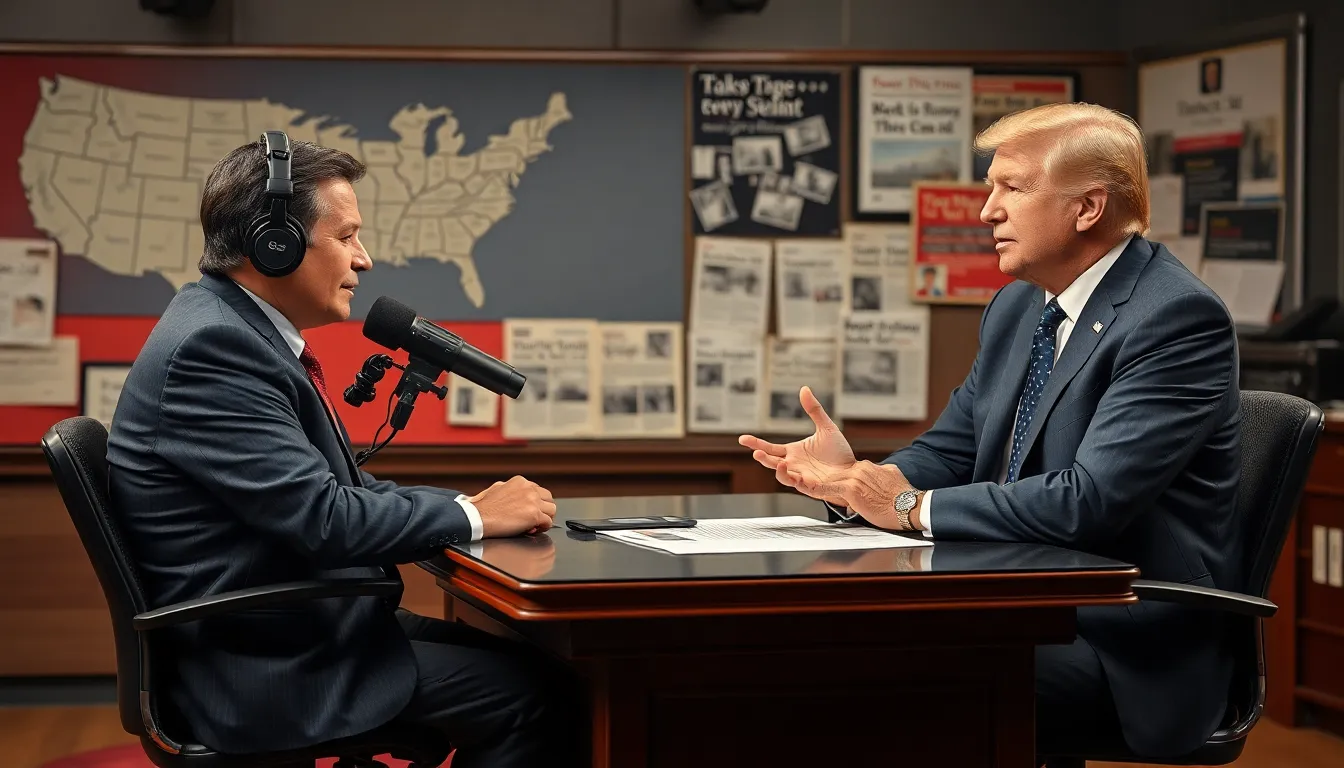Table of Contents
TogglePolitical interviews are the ultimate showdown where charisma meets tough questions. Picture this: a candidate, armed with charm and a smile, facing a journalist wielding a notepad and a penchant for hard-hitting inquiries. It’s a spectacle that keeps viewers on the edge of their seats, wondering if the candidate will stick to their talking points or slip on a banana peel of their own making.
Understanding Political Interviews
Political interviews encapsulate a crucial interaction between journalists and candidates. These encounters reveal insights about candidates’ policies, personalities, and readiness for office.
Definition and Purpose
Political interviews involve direct questioning of candidates by journalists or interviewers. Their primary purpose lies in uncovering important information about political positions and intentions. Such interviews allow candidates to provide clarity on their platforms. They also enable voters to assess character and decision-making abilities. Engaging in these dialogues, candidates reveal their preparedness for potential challenges during their tenure in office.
Importance in Politics
Political interviews play a vital role in shaping public opinion. They foster transparency by holding candidates accountable to voters. Voters gain access to candidates’ viewpoints on pressing issues through these encounters. Effective interviews influence perceptions and can sway undecided voters. They serve as a medium for candidates to communicate their vision, demonstrating competence and relatability. Additionally, these interviews highlight media’s role in maintaining democratic processes. They help ensure candidates remain responsive to audience concerns.
Types of Political Interviews

Political interviews vary significantly in format and purpose. Understanding these types enhances the effectiveness of both candidates and journalists.
Print vs. Broadcast Interviews
Print interviews appear in newspapers and magazines, focusing on detailed answers and nuanced discussion. These interviews allow candidates to express policies in depth, giving readers a comprehensive view of their positions. Broadcast interviews occur on television or radio, emphasizing immediacy and visual storytelling. These interviews capture the candidate’s body language and tone, factors that significantly influence audience perception. Both formats aim to inform voters but utilize different techniques to engage their respective audiences.
On-the-Record vs. Off-the-Record
On-the-record interviews involve statements attributed directly to candidates, making them publicly accessible. Such interviews ensure transparency, allowing voters to hold candidates accountable for their words. Off-the-record interviews, in contrast, feature insights not intended for public release. Journalists may use this format to obtain candid responses, gaining a deeper understanding of the candidate’s views while respecting confidentiality. Each type serves a unique purpose, balancing the need for information with the candidates’ privacy.
Techniques Used in Political Interviews
Political interviews employ a range of techniques to extract valuable information from candidates. Journalists utilize various methods to ensure interviews yield substantive content.
Questioning Strategies
Interrogative approaches significantly influence the quality of political interviews. Open-ended questions encourage candidates to elaborate on their views, while closed questions prompt concise answers. Probing questions often clarify ambiguous statements, helping to reveal deeper insights. Journalists may also use hypothetical scenarios to explore candidates’ reactions to potential challenges. Employing a mix of these strategies allows for a well-rounded understanding of candidates’ policies and positions.
Managing Subject Responses
Effective management of subject responses plays a crucial role in political interviews. Interviewers maintain control by actively listening and adapting questions based on candidates’ answers. The technique of redirecting the conversation helps uncover more relevant information when candidates attempt to evade direct inquiries. Additionally, journalists may use silence strategically, encouraging candidates to fill pauses with further elaboration. Balancing assertiveness with respect establishes an environment where candidates feel compelled to engage transparently.
Challenges in Political Interviews
Political interviews face several challenges that affect their outcomes. These hurdles can impact the integrity and effectiveness of the information shared.
Media Bias and Representation
Media bias presents a significant challenge in political interviews. Journalists often have their own perspectives, shaping the narrative around candidates. This bias can lead to skewed coverage that misrepresents the candidates’ views or intentions. Different media outlets may highlight varying aspects of a candidate’s policies, impacting public perception. Audiences may struggle to find balanced reporting amid this landscape, causing confusion about candidates’ true positions. Moreover, representation issues arise when certain voices are prioritized over others. Underrepresented candidates may not receive adequate coverage, limiting their chances to connect with voters. Thus, ensuring fair representation remains crucial in political interviews.
Ethical Considerations
Ethical considerations are vital in the realm of political interviews. Journalists face the responsibility of maintaining objectivity while probing for answers. Questions must align with the public’s right to know, balancing transparency with respect for candidates. Misleading tactics or sensationalism can undermine the interview’s integrity. Furthermore, journalists must navigate privacy concerns, particularly regarding sensitive topics. Addressing these issues requires careful thought and adherence to ethical standards. When journalists uphold these principles, they promote trust and credibility in the political discourse. Candidates also bear the responsibility to represent their policies truthfully, ensuring voters receive accurate information.
Political interviews are essential in the democratic process. They not only provide a platform for candidates to express their policies but also hold them accountable to the public. The interplay between journalists and candidates fosters transparency and encourages informed voting decisions.
As the media landscape evolves so do the techniques and formats of these interviews. Each type plays a crucial role in shaping public perception and understanding of candidates. By navigating the complexities of political interviews effectively both journalists and candidates can contribute to a more informed electorate.
Ultimately these interactions are pivotal in bridging the gap between candidates and voters ensuring that the voices of the public are heard and considered in the political arena.








